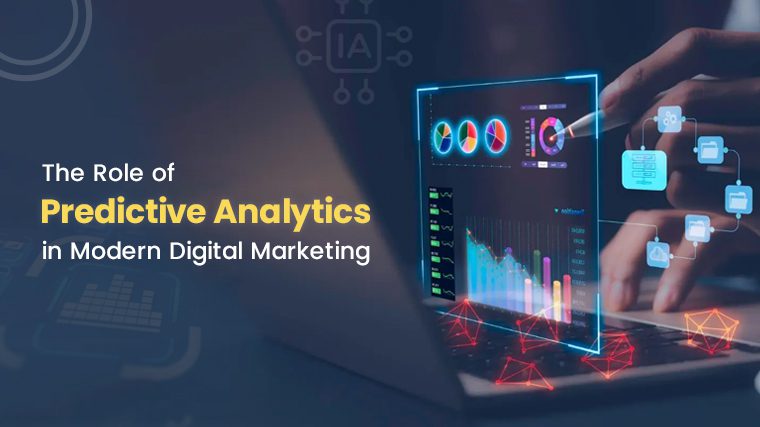
Any digital marketing agency UK now relies on predictive analytics to transform its operations because this technology enables it to predict customer behaviours while improving their strategies and strengthening its advertising techniques. Through the combination of historical data analysis and statistical algorithms and machine learning models, predictive analytics provides marketing teams with future outlooks that enable them to make strategic choices for their promotional strategies.
Overview of Predictive Analytics in Digital Marketing
The process of predictive analytics uses data analysis to create future outcome predictions. The analysis of consumer data, including purchase histories and engagement metrics, allows virtual advertising and marketing professionals to forecast future behaviours and their associated destiny capability churn and campaign responses.
This proactive approach shifts advertising strategies from reactive to anticipatory, fostering greater personalised and powerful engagements with target audiences.
Key Applications of Predictive Analytics
Enhanced Customer Segmentation
Traditional segmentation methods regularly rely on large demographic facts. Predictive analytics delves deeper, figuring out the styles and behaviours of organisational customers based totally on their likelihood to reply to positive advertising and marketing efforts. This granularity permits more particular focus on and personalised messaging.
Improved Lead Scoring
By assessing ancient statistics, predictive fashions can assign ratings to leads based totally on their possibility of conversion. This allows income and advertising groups to prioritise efforts on possibilities with the very best capacity, optimising resource allocation and increasing conversion rates.
Churn Prediction and Prevention
Predictive analytics can discover indicators that a client is likely to disengage or stop a carrier. Recognising these signs and symptoms early permits groups to enforce retention strategies, consisting of customised gifts or centred communications, to keep consumer loyalty.
Personalised Marketing Campaigns
Understanding individual purchaser choices and behaviours permits the advent of tailor-made marketing messages and gives. This personalisation complements client enjoyment, leading to higher engagement and conversion fees.

Optimised Marketing Spend
Predictive models can forecast the potential ROI of diverse advertising and marketing channels and campaigns, guiding price range allocation to the handiest strategies. This ensures that advertising and marketing expenditures are each efficient and impactful.
The Integration of AI and Machine Learning
The incorporation of artificial intelligence (AI) and machine learning in predictive analytics has substantially amplified its competencies. These technologies can process sizeable datasets at superb speeds, uncovering complex patterns and insights that are probably neglected via human analysis on your own. For example, AI-driven predictive analytics can dynamically modify marketing techniques in real-time primarily based on emerging trends and consumer behaviours.
Case Studies Highlighting Success
Retail Industry
A prominent online store applied predictive analytics to customise its homepage and email campaigns for male or female users. This method brought about a full-size growth in click-through rates and common order price, demonstrating the strength of data-driven personalisation.
Food and Beverage Sector
Yum Brands, the parent company of Taco Bell and KFC, implemented AI-driven marketing strategies to enhance customer interactions through their platforms. Their analysis of customer data enabled them to provide personalised email campaigns, which led to better purchase numbers and fewer customer churns.
Challenges and Considerations
While predictive analytics offers big benefits, its implementation isn’t without demanding situations:
- Data Quality: The accuracy of predictions closely relies upon the satisfaction and completeness of the statistics used. Inaccurate or incomplete data can lead to faulty techniques.
- Privacy Concerns: Collecting and reading customer statistics must be accomplished in compliance with data protection rules. Transparency and moral considerations are paramount to keep consumers accepting as true.
- Resource Intensive: Developing and maintaining predictive models require good-sized funding in generation and skilled employees.
Statistics That Show the Impact of Predictive Analytics in Digital Marketing
To recognise the strength of predictive analytics in virtual advertising, recall the subsequent data-driven insights:
- Adoption and Usage
- According to Forbes, about 91% of top entrepreneurs say predictive analytics is a key issue in their advertising and marketing fulfillment.
- According to Gartner, about 68% of marketing leaders use predictive analytics to improve customer segmentation.
- Revenue Growth and ROI
- According to Forbes, businesses that use predictive analytics are 2.9 times more likely to document sales booms higher than the industry average.
- According to Forbes, predictive analytics facilitates marketers gaining a 15–20% boom in ROI on common.
Predictive Analytics and Online Reputation Management
In today’s virtual-first world, your brand’s reputation may be built or damaged by patron interactions online. Predictive analytics is now gambling an essential position in online popularity control via proactively identifying trends in purchaser sentiment before they escalate into full-blown issues.
By analysing social media hobby, online evaluations, and comments across digital channels, groups can anticipate ability reputation dangers and deal with them proactively. This is particularly crucial for manufacturers in exceedingly competitive markets like London, in which standing out from the group calls for more than simply visibility — it calls for agreement.
A reliable reputation management company London will use predictive equipment to stumble on patterns that indicate dissatisfaction or brand fatigue, enabling instantaneous interventions including strategic content responses, targeted evaluation generation campaigns, or improved customer service efforts.
Ultimately, predictive analytics empowers groups to shape their narrative, defend their digital presence, and hold a continually advantageous image throughout systems — a central carrier we offer at e intelligence.
Why Predictive Analytics is a Must-Have for UK Marketing Agencies
With the growing complexity of client behaviour and the developing quantity of virtual touchpoints, companies want advanced gear to live aggressively. For any forward-questioning digital marketing company UK, predictive analytics has ended up being a critical issue of success.
From PPC ad optimisation to clever content material concentrated on, predictive analytics permits groups to deliver higher ROI for their customers. Leading digital marketing companies in the UK are leveraging this technology to design smarter campaigns that reply to person wishes earlier than they even stand up — increasing engagement, reducing bounce fees, and ultimately, boosting sales.
For example, a digital marketing agency London may use predictive fashion to tailor seasonal campaigns for specific target market segments across a couple of boroughs, considering beyond campaign performance, local shopping behaviour, and even nearby events.
This predictive energy isn’t always simply reshaping how corporations function — it’s also redefining client expectations. Agencies that don’t integrate predictive capabilities are falling behind in a landscape wherein data-driven precision is the new regular.
 The Future of Predictive Analytics in Digital Marketing
The Future of Predictive Analytics in Digital Marketing
As technology is evolving, predictive analytics is poised to become even more fundamental to virtual advertising and marketing techniques. Advancements in AI and device studying will similarly refine predictive fashions, presenting deeper insights and extra accurate forecasts. Businesses that embrace those tools may be better placed to expect market developments, recognise purchaser wishes, and deliver personalised stories that drive loyalty and increase.



